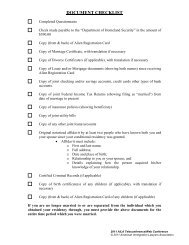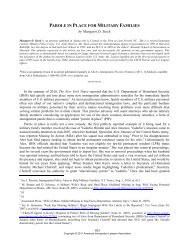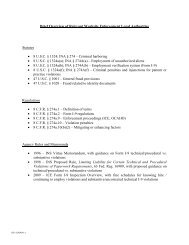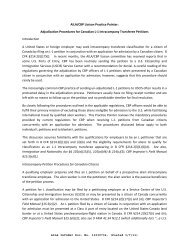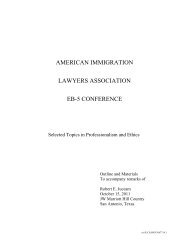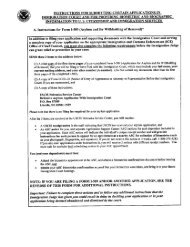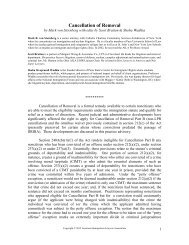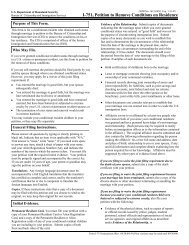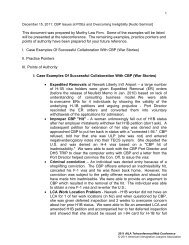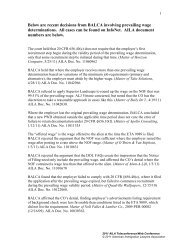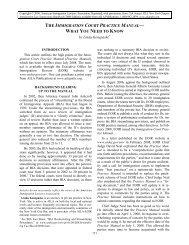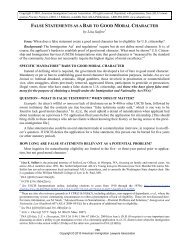Resources for 8-24-11 Seminar - AILA webCLE
Resources for 8-24-11 Seminar - AILA webCLE
Resources for 8-24-11 Seminar - AILA webCLE
You also want an ePaper? Increase the reach of your titles
YUMPU automatically turns print PDFs into web optimized ePapers that Google loves.
identifies and discusses the top three ICE priorities as 1) noncitizens who pose a dangerto national security or a risk to public safety; 2) recent illegal entrants; and 3) noncitizenswho are fugitives or otherwise obstruct immigration controls. 13 The memo indicates thatICE resources should primarily be committed to advancing these priorities and that, giventhe limited resources of the agency, ICE employees should exercise sound judgment anddiscretion consistent with these priorities in carrying out en<strong>for</strong>cement.Peter S. Vincent, Principal Legal Advisor, ICE, “Guidance Regarding UNonimmigrant Status (U visa) Applicants in Removal Proceedings or with FinalOrders of Deportation or Removal” (Sept. 25, 2009). This memo provides fieldguidance with respect to persons with pending U visa petitions who either are 1) subjectto a final administrative order of removal and request a stay of removal or 2) are inremoval proceedings. Explaining that ICE officers have discretion to stay removal wherean individual with a pending U visa petition demonstrates prima facie eligibility <strong>for</strong> thevisa, the memo explains how ICE is to coordinate with USCIS to obtain a prima faciedetermination of eligibility. The memo also discusses factors that ICE officers shouldconsider in exercising their discretion where prima facie eligibility is shown.Julie L. Myers, Assistant Secretary, ICE, “Prosecutorial and Custody Discretion”(Nov. 7, 2007). This memo concerns the exercise of prosecutorial discretion with respectto arrest and custody decisions related to nursing mothers.John P. Torres, Director, ICE, “Discretion in Cases of Extreme or Severe MedicalConcern” (Dec. <strong>11</strong>, 2006). This memo reiterates the importance of ICE officersexercising prosecutorial discretion when making custody determinations with respect toadults and juveniles transferring from hospitals, social services or other law en<strong>for</strong>cementagencies who have severe medical conditions (including psychiatric). The memoexplains that officers have a responsibility to identify and respond to cases presentingmeritorious health claims in which detention may not be in ICE’s best interest. Thememo explains the procedures to be followed and provides guidance on how to make adetermination about the seriousness of the medical problem.ICE, “Detention and Deportation Officer’s Field Manual” (updated Mar. 27, 2006).-Chapter 20.8, “Deferred Action.” This chapter describes generally the standardand procedures <strong>for</strong> determining whether to grant deferred action.-Chapter 20.9, “Exercising Discretion.” This chapter describes generally thestandards and procedures <strong>for</strong> exercising prosecutorial discretion.William Howard, Principal Legal Advisor, ICE, “Prosecutorial Discretion” (Oct. <strong>24</strong>,2005). This memo, which is still followed, focuses on when and how prosecutorialdiscretion can be used by trial attorneys. It explains how the exercise of prosecutorialdiscretion is critical to managing work overload and adhering to priorities. It also detailsvarious ways in which trial attorneys can and should consider exercising prosecutorial13According to the memo, numbers 2 and 3 are equal priorities to one another, butfall below number 1.18



